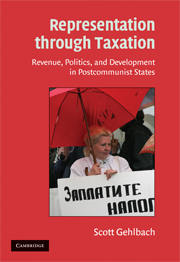Crossref Citations
This Book has been
cited by the following publications. This list is generated based on data provided by Crossref.
Appel, Hilary
2008.
Is It Putin or Is It Oil? Explaining Russia's Fiscal Recovery.
Post-Soviet Affairs,
Vol. 24,
Issue. 4,
p.
301.
O'Dwyer, Conor
2008.
Re-stating Party Development in Central and Eastern Europe: A Response.
Czech Sociological Review,
Vol. 44,
Issue. 6,
p.
1181.
Vanhuysse, Pieter
2008.
Introduction: Advances in the Study of Post-Communist States and Public Administrations.
Czech Sociological Review,
Vol. 44,
Issue. 6,
p.
1151.
Vanhuysse, Pieter
2009.
Advances in the Study of Post-Communist States and Public Administrations.
SSRN Electronic Journal,
Brown, J. David
Earle, John S.
and
Gehlbach, Scott
2009.
Helping Hand or Grabbing Hand? State Bureaucracy and Privatization Effectiveness.
SSRN Electronic Journal,
BROWN, J. DAVID
EARLE, JOHN S.
and
GEHLBACH, SCOTT
2009.
Helping Hand or Grabbing Hand? State Bureaucracy and Privatization Effectiveness.
American Political Science Review,
Vol. 103,
Issue. 2,
p.
264.
Dinissa, Duvanova
2010.
Regulatory Regimes and Employer Organization: The Analysis of Postcommunist Business-State Relations.
SSRN Electronic Journal,
Brown, J. David
Earle, John S.
and
Gehlbach, Scott
2011.
Privatization.
SSRN Electronic Journal,
2011.
The Politics of Inequality in Russia.
p.
152.
Duvanova, Dinissa S.
2011.
Firm Lobbying versus Sectoral Organization: The Analysis of Business-State Relations in Post-Communist Russia.
Post-Soviet Affairs,
Vol. 27,
Issue. 4,
p.
387.
Chaisty, Paul
2012.
Waiting for Reform under Putin and Medvedev.
p.
140.
Frye, Timothy
2012.
In From the Cold: Institutions and Causal Inference in Postcommunist Studies.
Annual Review of Political Science,
Vol. 15,
Issue. 1,
p.
245.
Trüdinger, Eva-Maria
and
Hildebrandt, Achim
2013.
Causes and contexts of tax morale: Rational considerations, community orientations, and communist rule.
International Political Science Review,
Vol. 34,
Issue. 2,
p.
191.
Moore, Mick
2013.
Obstacles to Increasing Tax Revenues in Low Income Countries.
SSRN Electronic Journal,
Buckley, Noah
Frye, Timothy
Gehlbach, Scott
and
McCarthy, Lauren
2013.
Cooperating with the State: Evidence from Survey Experiments on Policing in Moscow.
SSRN Electronic Journal,
Chaisty, Paul
2013.
The Preponderance and Effects of Sectoral Ties in the StateDuma.
Europe-Asia Studies,
Vol. 65,
Issue. 4,
p.
717.
Remington, Thomas F.
and
Marques, Israel
2014.
The Reform of Skill Formation in Russia: Regional Responses.
SSRN Electronic Journal,
Bonatti, Luigi
and
Haiduk, Kiryl
2014.
Dualism and growth in transition economies: a two-sector model with efficient and subsidised enterprises.
Post-Communist Economies,
Vol. 26,
Issue. 1,
p.
1.
Dhingra, Swati
2014.
Reconciling Observed Tariffs and the Median Voter Model.
Economics & Politics,
Vol. 26,
Issue. 3,
p.
483.
Marques, Israel
2014.
Firms and Social Policy in the Post-Communist Bloc: Evidence from Russia.
SSRN Electronic Journal,



